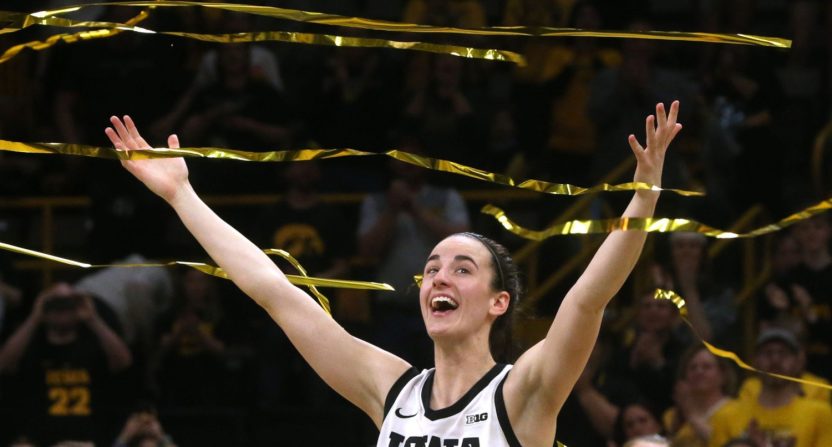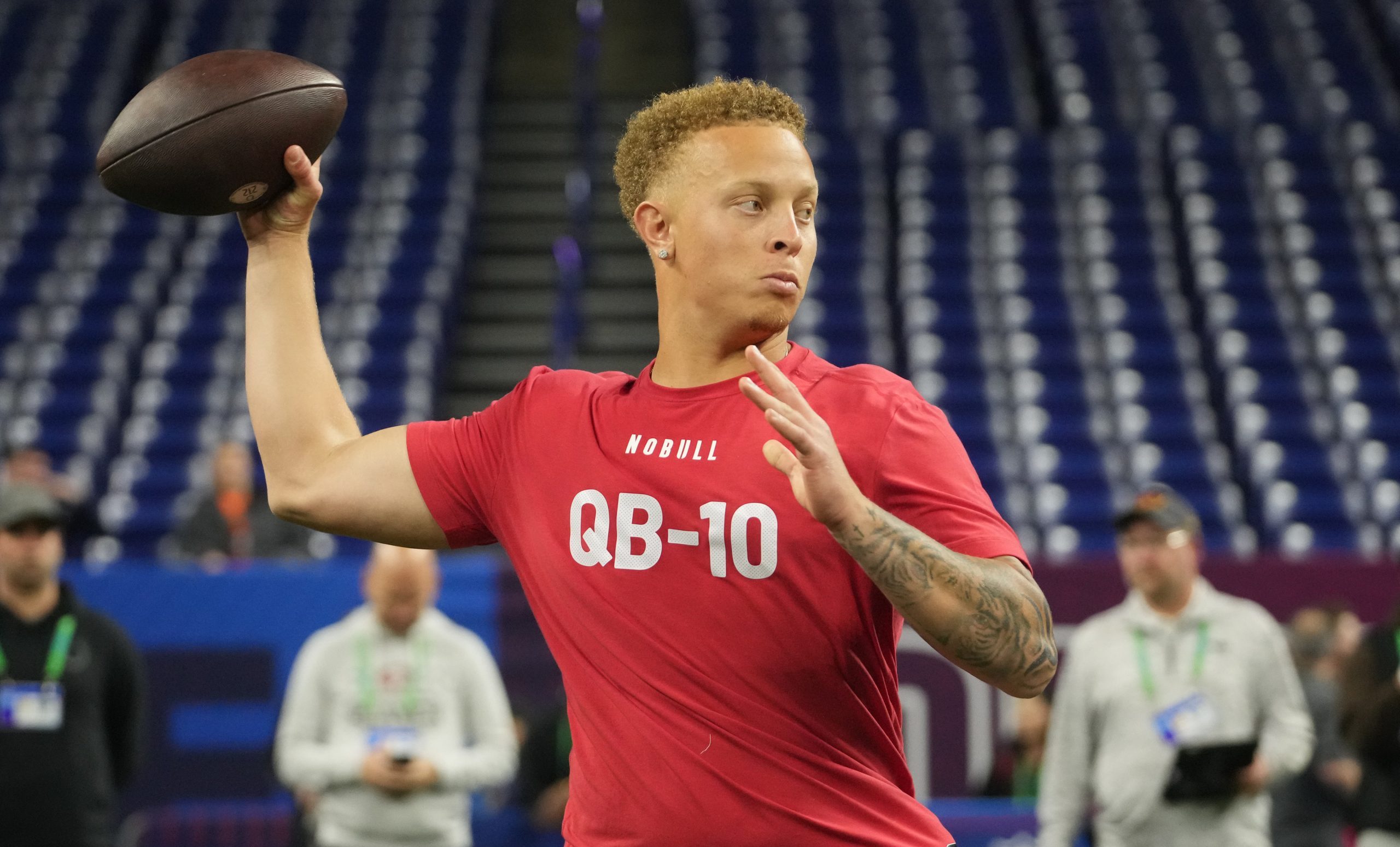Around Iowa Hawkeyes women’s basketball star Caitlin Clark’s decision to declare for the WNBA Draft last month, there was a lot of discussion about what she makes in name, image, and likeness money in college and what she’s likely to make in the WNBA. And that saw claims from the likes of Darren Rovell that Clark would make more money staying in college, which were very obviously wrong.
But those claims led to interesting and detailed pieces on Clark’s current and future earnings. They covered how she doesn’t receive any money from Iowa’s NIL collective, and how most of her endorsements are with national businesses that seem likely to stick with her at the next level (where she’ll also receive a salary, unlike in the NCAA). However, John Ourand at Puck has a new report that there was at least an idea for one specific NIL deal for Clark that would certainly not have translated to the WNBA, and from an unusual source.
That would be a collection of TV networks, led by Fox, paying Clark to stay in the college basketball ranks:
Clark is such ratings gold, in fact, that Fox executives contemplated reaching out to other networks to see if they could come up with an enticing N.I.L. offer that would convince her to stay in the college ranks for one more season. Alas, talks never materialized (nobody ever approached Clark), and ended before they could get going last week, when the superstar formally announced that she was headed to the WNBA next season. She is the overwhelming favorite to be the top overall pick.
While that deal didn’t progress too far, it’s certainly an unusual and interesting idea. And the networks that broadcast college basketball certainly would have major interest in Caitlin Clark staying in the NCAA ranks. As Ourand notes, Clark was involved in the most-watched games of all time on six different networks and platforms: ABC, Fox, NBC, Big Ten Network, FS1, and Peacock. And her final regular-season game on Fox Sunday, where she passed Pete Maravich’s all-time NCAA Division I points record (although some viewers missed it due to local affiliate technical difficulties), averaged 3.39 million viewers, the most-watched women’s college basketball game on any network since 1999. That got Fox Sports president (insights and analytics) Mike Mulvihill to drop a line on Twitter about how great it was to have Clark in the NCAA ranks, with a joke urge to her to continue there:
Caitlin, it’s not too late to go for your MBA! You can never have too much education! https://t.co/eN9O2jo5x5
— Michael Mulvihill (@mulvihill79) March 5, 2024
The actual deal here is obviously a moot point in the case of Caitlin Clark. There wasn’t a proposal actually made to other networks, and there was nothing brought to her before she declared for the draft. But the question of if it would be worth it for networks to pay a specific athlete to stay in the college ranks is interesting, and has broader possible implications. And there’s a notable dimension with Clark in particular in terms of network alignment, which suggests who would have been the “other networks” here.
The WNBA’s TV deals are with ABC/ESPN, CBS, Amazon, and ION. So, of the networks listed above, only ABC would be able to show Clark’s professional games. The other five are owned by Fox (which directly owns their broadcast network and FS1, and has a majority stake in the Big Ten Network) and Comcast (which owns NBC and Peacock). And those networks got the majority of Clark’s games given their Big Ten deals (CBS also has a Big Ten deal, but their only women’s basketball game is the tournament championship).
ESPN and ABC got some out-of-conference Iowa games at schools in conferences they have deals with. But most of Clark’s games this season aired on Fox or NBC platforms. And those companies don’t have WNBA deals, so they’re the logical fits for the idea of trying to pay Caitlin Clark to stay at the NCAA level.
While that didn’t happen in this case, it’s not inconceivable the idea could be tried down the road if there’s another athlete that particular broadcasters can profit from remaining in college. The concept might be interesting on the college football to NFL side, and we’ve already seen some talk of athletes maybe staying there longer to try and pick their pro landing spot (although much of that has been walked back).
But this would seemingly make less sense with a college football to NFL path, as the major CFB broadcasters carry that pro league as well. So they’ll still get to show that athlete. However, there is another angle to consider there; what if paying a top athlete to stay at a particular school boosts that school relative to its competition from other conferences the network doesn’t have deals with? Could it be worth it for Fox to pay a top Big Ten athlete like Ohio State’s Marvin Harrison Jr. to stay and boost the Buckeyes relative to SEC schools they don’t have the broadcast rights to?
What about in men’s college basketball? At the moment, ABC/ESPN and TNT have the NBA rights. So Fox, NBC, and CBS could theoretically benefit from a particular player staying in college longer. And the idea of boosting a team relative to teams in other conferences could apply there too.
The latest
- Could NFL see next Saudi sportswashing controversy?
- ESPN and NBA have reportedly ‘essentially come to terms’ on deal that would keep Finals on ABC
- G/O Media sells The Onion to ‘Global Tetrahedron,’ ex-NBC reporter Ben Collins to serve as CEO
- Eli Gold on Alabama exit: ‘You can’t argue with city hall.’
And it’s far from clear if it would be worth it for a broadcaster to pay any athlete the amount of money it would probably take to convince them to not turn pro. So it’s unlikely that we’ll see a deal like this actually proposed any time soon. But it’s still notable that this was under serious consideration at Fox.
The other interesting element to consider here is if this kind of deal would work given the NCAA’s NIL rules. Those rules currently prohibit paying an athlete just to play for a particular school, requiring them to do something off the field in return for NIL payments. And that could be a problem with broadcaster NIL deals.
Of course, there have been questions raised in many cases about the percentages of particular NIL payments that are really for endorsements versus just getting the player to play for a particular school. And the NCAA’s whole NIL rules are actually frozen at the moment thanks to a Tennessee court case.
But broadcasters paying athletes to stay at a certain level would seemingly at least be a very obvious pay-for-play situation, even if it was camouflaged by an athlete like Clark cutting a commercial or two for Peacock or FS1. We have seen athletes sign deals with Peacock before, but for specific games or to promote specific movies; paying an athlete to stay at a level would seem different. And the NCAA might not love that, which might be part of why this Clark idea was in the exploratory realm and didn’t lead to a firm offer before she made her draft declaration.
This conversation’s also significant in light of the ongoing discussions around college athletes likely eventually being declared employees. One big element of that is the idea of the athletes getting some money from college conferences’ TV deals, either directly or indirectly, which has been proposed by the likes of Jim Harbaugh. That doesn’t seem possible at the moment, but may be coming down the road.
But the idea of a broadcaster NIL deal for a college athlete is an interesting potential end run there. And while this particular concept around Caitlin Clark didn’t come to fruition, it’s notable that it was discussed. We’ll see if anyone returns to this idea down the road.
[Puck]







